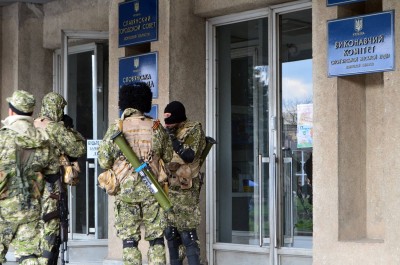Russia Sustains Conflict in Donetsk and Luhansk People's Republics in Eastern Ukraine
Russian-backed separatists reportedly began shelling an area near the "contact line" in Eastern Ukraine. Read about the recent incident and why Chancellor Nehammer and EU High Representative Josep Borrell are "very worried."
 EU High Representative Josep Borrell: "Such indiscriminate shelling of civilian infrastructures is totally unacceptable and represents a clear violation of the ceasefire and the Minsk agreements." / Picture: © Wikimedia Commons / Yevgen Nasadyuk (Євген Насадюк), CC BY-SA 3.0
EU High Representative Josep Borrell: "Such indiscriminate shelling of civilian infrastructures is totally unacceptable and represents a clear violation of the ceasefire and the Minsk agreements." / Picture: © Wikimedia Commons / Yevgen Nasadyuk (Євген Насадюк), CC BY-SA 3.0
The Organization for Security and Cooperation in Europe (OSCE) recently reported artillery fire in Eastern Ukraine.
According to the Ukrainian military, shots had been fired at a town near Luhansk from the area controlled by Russian-backed separatists.
Witnesses also reported hearing shots in the other separatist-controlled city of Donetsk.
The pro-Russia separatists claimed that the Ukrainian military fired upon them first, but the military has denied this and claims that it did not even return fire after the separatists began shelling.
Neither side reported any casualties, but a Kindergarten in Stanytsia Luhanska was reportedly hit by an artillery round.
The High Representative of the European Union for Foreign Affairs and Security Policy Josep Borrell condemned the shelling and the destruction of the Kindergarten in particular.
“Such indiscriminate shelling of civilian infrastructures is totally unacceptable and represents a clear violation of the ceasefire and the Minsk agreements. The European Union calls for an immediate end to the ongoing escalation of violence and commends Ukraine for its continued restraint,” said Borrell.
Despite Russia’s claim that it was withdrawing some of its troops, Mr. Borrell expressed his skepticism and concern due to reports from NATO that Russia has actually increased its troop presence on the Ukrainian border.
“We have gotten news about some withdrawal of troops, but we do not have evidence of it,” stated Borell.
On the other hand, Borrell said there was evidence of an escalation in shelling in Eastern Ukraine.
When paired with the reported disinformation campaign about alleged Ukrainian attacks on Russians in Ukraine and the Russian Duma’s vote to ask President Putin to recognize the independence of the two separatist republics, Mr. Borrell emphasized that “we are very worried.”
At an informal meeting of EU heads of state and government in Brussels, Austrian Chancellor Karl Nehammer echoed Borrell’s concerns about the Russian announcement regarding a troop withdrawal from the Ukrainian border.
“We assume that an invasion of Ukraine is possible at the push of a button. It is a tense situation, and firefights can develop quickly there,” said Nehammer.
The chancellor added that it could also be “a narrative by Russia that intervention is necessary because of the escalation on the ground.”
“Now the most important thing is to find confidence-building measures in a dialogue format. At the same time, you have to be prepared for the EU to react clearly, decisively and sustainably in the event of an attack using military means. The EU Commission is preparing a corresponding package of sanctions,” emphasized Nehammer.



